Yerosan Lami, a 19-year-old young boy, was born and raised in Hora Ayetuu, a small village in the Ambo District of the West Shewa Zone. He attended school in Ambo until the seventh grade. However, Yerosan’s life took an unexpected turn when Oromo artist Haculu Hundesa was tragically killed three years ago.
With profound reverence and admiration for Hachalu’s contributions to Oromo art and struggle, Yerosan attended his funeral that morning. Hachalu was not just a respected figure to Yerosan but someone he deeply admired and loved. Unfortunately, Yerosan was unable to bid farewell and pay his respects as he had anticipated.
Yerosan vividly remembers the tragic incident that unfolded when he arrived at Hachalu’s family’s house. Without any prior warning, the Oromia Special Forces opened fire, causing a devastating loss of lives, numerous injuries, and lasting trauma. Yerosan himself was shot in the leg and received medical treatment at Ambo Referral Hospital. However, despite being grateful for his survival, he was unable to fully recover and continues to suffer from his injuries.
The abrupt end of Yerosan’s academic journey occurred when he fell behind in his studies. While his friends advanced to Grade 10, he had no choice but to drop out of school. It was a difficult decision, forcing him to confront the harsh realities of life as a struggling individual.

Yerosan shared his deep feelings with the staff members of OLLAA,
“I feel so helpless and desperate. My health is
declining rapidly and I’m terrified that I
won’t be able to get the assistance I need.
Everyday life is becoming increasingly
difficult to me, and I’m not sure what to do next.”
Yerosan’s family faces significant financial hardship. They are considered poor and have expended their resources on Yerosan’s treatment. Unable to work and earn a living like others, Yerosan relies on the help of others, which is both challenging and humbling for him. Presently, he finds himself in an incredibly difficult situation – homeless and unable to secure a place to stay due to his financial circumstances.
As June approaches, Yerosan is reminded of his past life, contemplating whether justice will ever be served in Ethiopia. Will individuals like him, who have made tremendous sacrifices, ever see the justice they rightfully deserve?
International Law
The rights to life, liberty, and personal security are fundamental principles enshrined in several internationally recognized documents, including the Universal Declaration of Human Rights (UDHR), the International Covenant on Civil and Political Rights (ICCPR), the UN Convention against Torture (CAT), the African Charter on Human and People’s Rights (ACHPR), and the Constitution of the Federal Democratic Republic of Ethiopia (FDRE). As a signatory to these important human rights agreements, Ethiopia bears the responsibility of upholding these rights.
It is imperative that the security forces of the government exercise their authority without resorting to abuse. They must act in accordance with these international human rights norms to ensure the protection and well-being of all individuals.
Furthermore, the ICCPR’s article 2(3) explicitly states that individuals whose rights have been violated have the right to seek an appropriate remedy from the signatories of the convention. Consequently, Yerosan is entitled to an adequate remedy from the Ethiopian government, and the government forces must be held accountable for any violations of international law.

